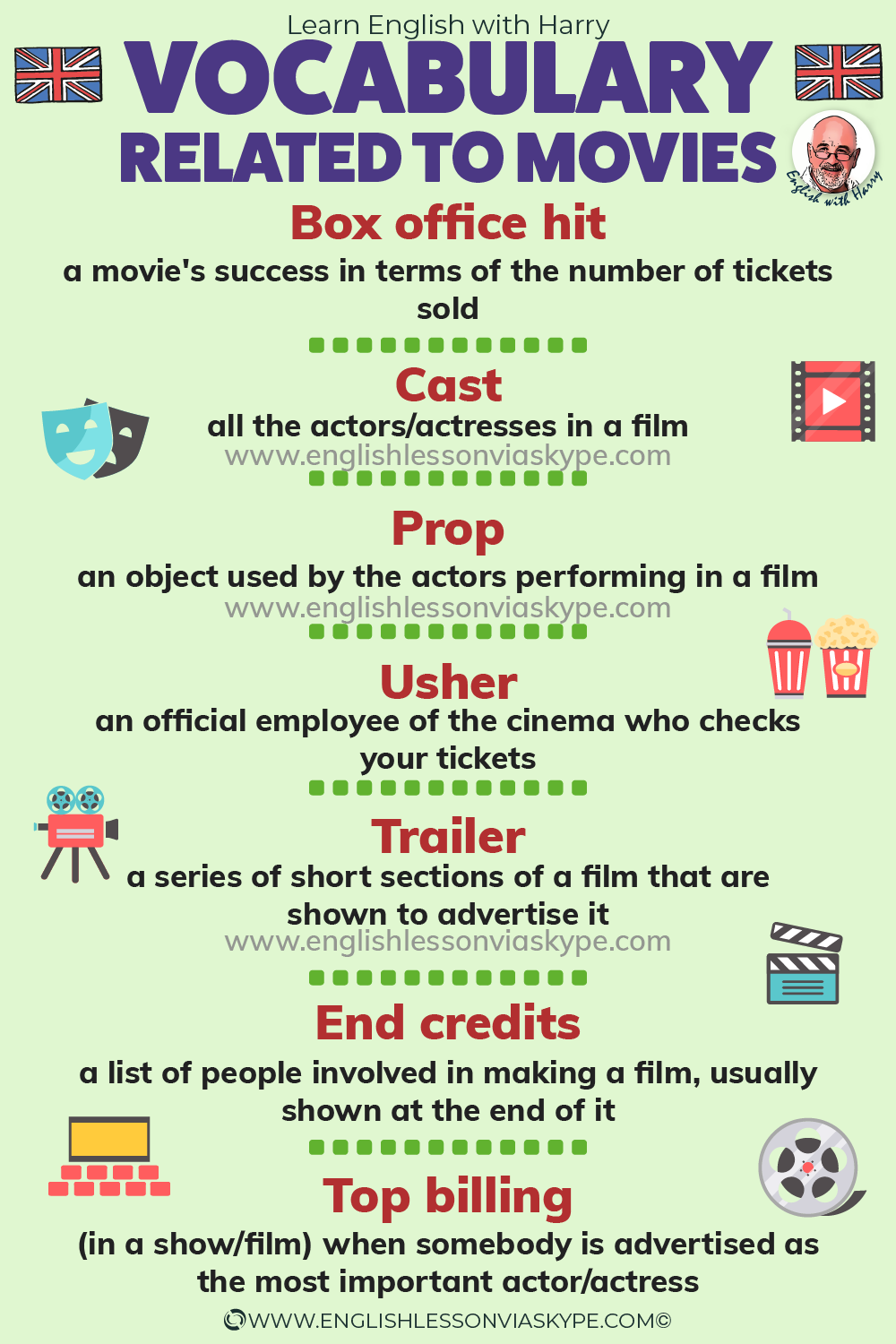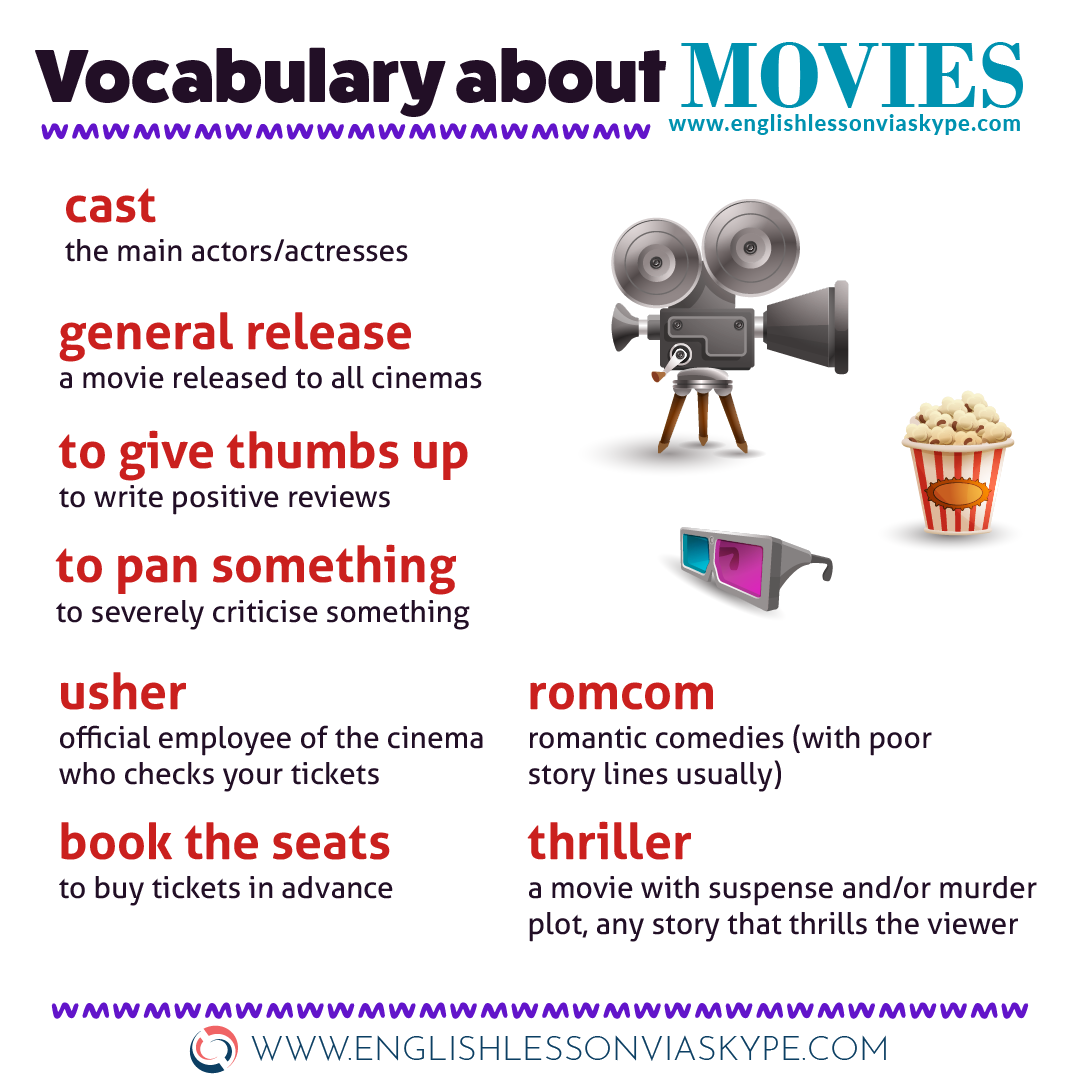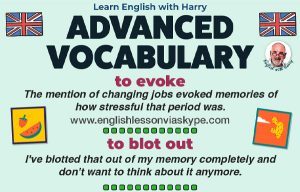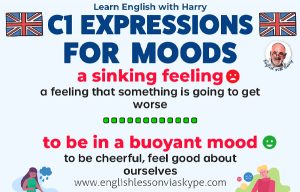Learn English vocabulary related to movies and entertainment. We will also focus on different types of movies in English and English adjectives for describing movies. british council learn english
As a bonus, you will also learn English movie idioms.
The show must go on, to run the show, to steal the show.
Improve your English vocabulary, practice and be able to talk about the latest or your favourite movies in English.
English vocabulary related to movies
Harry
Adjectives for talking about movies
Despite all the home entertainment we can enjoy these days and in spite of all the many other distractions, going to the movies is still as enjoyable as ever. So let’s look at English vocabulary related to movies and learn some English words and phrases connected with movies.
And at the end, you will also find English movie idioms.
give a gift of learning Offer up to 50% off
Great way to improve your English. Use code END2023

What verb should we use to describe going to the movies?
Well, simply going to is sufficient as it sums up the exact action of leaving your home and travelling to the cinema to watch whatever is on.
We can of course as easily say
to see a movie or to watch a movie
I am going to see a movie with my friends, would you like to come along?
We are watching that old movie you like will you sit down and join us?
What movie are we watching tonight then? I saw that movie last week it is great.
English Vocabulary related to Movies

useful words and phrases
multiplex – a cinema with many different screens so it can show many films at the same time
premiere – the first showing of a film before it’s available for people to see
Example:
If you have ever been invited to a film premiere, then you have had an amazing experience.
to book the seats /tickets – to reserve tickets
to give thumbs up – to write positive reviews
to pan something – to severely criticise something
cast – all the actors/actresses in a film
Example:
A film premiere often includes members of the cast appearing to sign autographs and have their photos taken for the daily papers.
to take your seats – to find your row and number and sit down
general release – released in all cinemas and available for people to see or buy
usher – an official employee of the cinema who checks your tickets
director – somebody who tells the actors and technical staff what to do while making a film
English Vocabulary related to Movies

English Vocabulary related to Movies
trailer – a series of short sections of a film that are shown to advertise it
opening scene – the first part of a film
remake – a modern version of an existing film
end credits – a list of people involved in making a film, usually shown at the end of it
soundtrack – the music that goes with a film
to take top billing – in a show/film when somebody is advertised as the most important actor/actress
dubbed – having the sounds/speech on a film changed to a different language
Example:
I don’t like watching films that have been dubbed, I prefer to hear the actors’ own voices.
subtitles – the text written in small captions at the bottom of the screen (especially in another language)
Example:
Subtitles for this film are available in French, Italian, and Spanish.
special effects – computer graphics or technical skills used in a film to create an illusion
visual effects – images created by special equipment
to bring out – to release a film, music album or book
the leading part – the main role
prop – an object used by the actors performing in a film
supporting cast – the other actors/actresses apart from the leading ones
sequel – a film (book, play) that continues the story of a previous version
prequel – a film (book, play) about events that happened before those of a previous popular film (book, play)
box office hit – a movie’s success in terms of the number of tickets sold
cameo /ˈkæm.i.əʊ/ – a brief appearance of a famous actor in a film
English Vocabulary related to Movies
22 advanced English adjectives for describing movies
absorbing – very interesting, keeps your attention for a long time
action-packed – with a lot of thrilling incidents
captivating – very exciting
controversial – causing a lot of discussions or disagreement
convoluted – overcomplicated
dreary – dull and uninteresting
gripping – very interesting
hilarious – very funny
intriguing /ɪnˈtriːgɪŋ/ – very interesting in a way that arouses your curiosity
moving – causing strong emotions (usually in a good way)
outstanding – extremely good

overrated – overvalued
predictable – pretty obvious what is going to happen in each scene
riveting /ˈrɪvɪtɪŋ/ – keeps you glued to the screen
second-rate – mediocre, unexciting, nothing to write home about
slow-moving – developing very slowly
spine-tingling – enjoyably frightening
spooky – frightening and ghostly
thought-provoking – stimulating you to think about something, often something you haven’t thought of before
thrilling – exciting, action-packed
underrated – much better than what people believe
uplifting – making you feel happy and cheerful
different types of movies in English
So what type of movies do you like? This is usually where the problem starts. Which film you go to depends on whether you can reach an agreement as to the type (genre) of movie that most people will enjoy. There are many genres.
horror movie – scary movies with frightening scenes
romcom – romantic comedies (with poor storylines usually)
SciFi or science fiction – any story related to the future or in outer space
thriller – a movie with suspense and murder plot or any story that thrills the viewer
comedy – a film that tries to make people laugh
biopic – a biographical movie about a real person (living or dead)
documentary – a film that shows a true story, often shown on television
western – very old fashioned American wild-west movies with cowboys and gunfights
action movie – a movie with car chases
Marvel movies – very popular movies full of superheroes like Spider-Man
period film – a movie about lives in the previous centuries, typically in the 19th century
English Vocabulary related to Movies
Here are some phrases related to going to the movies that you may find useful:
What’s on? – What can we see there?
What’s showing at the local? – What film is on at the local cinema to your home
When does it start? – What time does it start at
How long is it running for? – How many weeks will it be on for
Who’s in it? – Who are the key actors/actresses
What’s it about? – What genre or type of film is it
English Movie Idioms

English idioms related to movies
And here are some English idioms related to movies:
the show must go on
Of course, show refers to the movie or theatre performance and even if there was a tragedy or serious event whilst filming the directors and actors in one voice would cry “the show must go on”.
So today in our ordinary lives we use this phrase for the same reason.
Example:
Michael had spent weeks organising the business presentation but when the day arrived he had terrible flu and wasn’t sure whether he good present it properly. However, his boss told him to take some tablets and do it as it was very important. “The show must go on”.
to run the show
When someone is trying to run the show it usually means someone is trying to control everything. This could refer to a business or in a family or even just organising a party.
Example:
David and Mary were annoyed with Stephen, he kept emailing them with new ideas and plans for the family get-together at Christmas. “Who does he think he is? He always wants to run the show.”
to steal the show
When someone in the cast or in a performance (amateur or professional) performs above everyone else we usually say that they stole the show.
Example:
Sam was playing the part of one of the main characters. His voice and mannerisms (way of acting) was very impressive. The audience loved him and he really stole the show.
to get the show on the road
This refers to getting something started.
Example:
Peter and Mary were planning a trip away with their 3 children. Once everything was ready, packed in the car and everyone seated, Mary said: “Right, let’s get the show on the road.”
to face the music
To accept the unpleasant results of your actions.
Example:
One of the technical team members broke some of the props and now has to face the music.
If you want to improve your English, please check out online English classes for you and your family and friends. And don’t forget about English learning courses that start from only €7.99.
speak better English with Harry podcast- episode 403
More Information
For more information in English Expressions, English Phrasal Verbs and English Grammar Rules, check out the following links:
Common English Idioms about Knowledge
8 English Idioms about Relationships
Vocabulary Words related to Reading
You can always study English advanced level at Learning English with the BBC and British council learn English
You will love these English lessons

Vocabulary For Describing Memories
Learn vocabulary to describe memories in English. These useful words and phrases will help you expand your vocabulary. This lesson


C1 English Expressions To Describe Moods
Learn C1 English expressions to describe moods. These English expressions will also be useful to you if you are preparing


Learn English Business Idioms
Here you will learn English business idioms – or should I say – English idioms related to business. Neck and